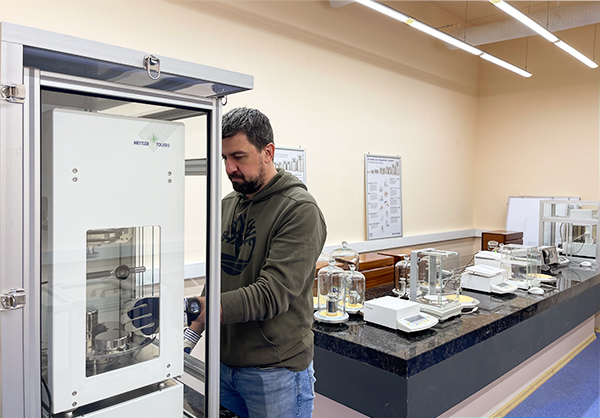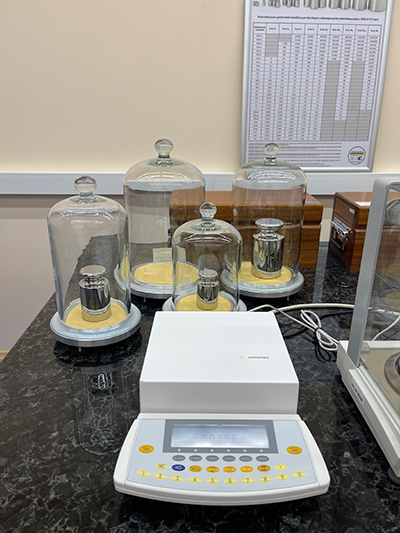Research and production laboratory for mass standards
(laboratory № 35-1)
History of the establishment of the secondary and the National measurement standards
The secondary standard of the unit of mass VETU 02-01-01-98 was established in 1998 in the laboratory of mass standards of the SE "UKRMETRTESTSTANDART" (at that time UkrCSM).
In the period from 2008 to 2019, the secondary standard was renewed and re-equipped. During this time, mechanical reference balances were replaced with electronic mass comparators; the old reference weights (manufactured in 1981) were replaced by two new reference mass standards with nominal mass 1 kg of accuracy class E0.
In 2017, the laboratory in which the standard is kept and used was overhauled. A new system for maintaining environmental conditions based on a precision air conditioner was installed.
In 2020, by the order of the Ministry of Economy of Ukraine No. 39 of 01.21.2020, the standard was given the status of a national standard of the unit of mass in the range from 2 kg to 20 kg and assigned the number NDETU M-06-2019.
The National measurement standard keeper is Vitalii TUHAI, head of the research and production laboratory for mass standards.
The laboratory conducts such types of metrological works:
- maintenance and research NDETU M-06-2019 - National measurement standard of mass in the range from 2 kg to 20 kg;
- participation in national and international comparison measurement;
- dissemination of the unit of mass from 1 kg reference standard weight to the weights with a nominal mass from 1 mg to 20 kg (accuracy classes E1 and E2);
- periodical research of the metrological characteristics of the National measurement standard;
- research and development in the field of mass measurement;
- organize and carry out of interlaboratory comparisons (proficiency testing) on the calibration of weights and non-automatic weighing instruments;
- conformity assessment of instruments for the bulk density measurement of cereals.
The National measurement standard consists of:
- Reference mass standard 1 kg E0 (2 units)
- Mass comparator CCE6
- Mass comparator CCE66
- Mass comparator CC1000S-L
- CCE1005 mass comparator
- Mass comparator CCE5004
- AX10005 mass comparator
- Mass comparator XPR26003LC
- Mass comparator CCE60K3
- Mikromec multisens data logger for temperature, rel. humidity and air pressure mesurement
Metrological characteristics of the National measurement standard:
- the value of the unit of mass that reproduces and stores the national standard is 1 kg. The expanded uncertainty of the mass is 50·10-9 kg;
- the range of mass unit dissemination - from 1 mg to 20 kg (the measurements in the range from 100 g to 10 kg carry out in automatic mode);
- expanded uncertainty U (with coverage factor k = 2, Р = 0.95) in the range from 1 mg to 20 kg - from 0.001 mg to 3 mg.
Use and storage conditions of the National measurement standard:
- reference weights are stored under double glass bell jars in a special fire-resistant metal safe;
- ambient air temperature is 20±0.5 °C; temperature changes no more than 0.3 °C per hour and no more than 0.5 °C in 12 hours;
- relative air humidity is from 40 to 60%, humidity changes no more than 5% in 4 hours.
Dissemination of the unit of mass unit
The unit of mass is disseminated from the reference mass standard of 1 kg using the subdivision and multiplication method. Further processing of the obtained results and estimation of uncertainty is performed using least squares method.
R & d works in the field of mass measurements:
- research, design and manufacturing of a robotic system for weights calibration based on the CCE66 mass comparator. This should make it possible to perform the calibrations in the range from 10 g to 50 g without the intervention of an operator, increase the accuracy of measurements (due to the exclusion of the uncertainty budget component caused by the operator);
- semi-automatic measuring instrument for determination of the density of weights in the range from 1 g to 1 kg using the hydrostatic weighing method.


 Укр
Укр  Eng
Eng 